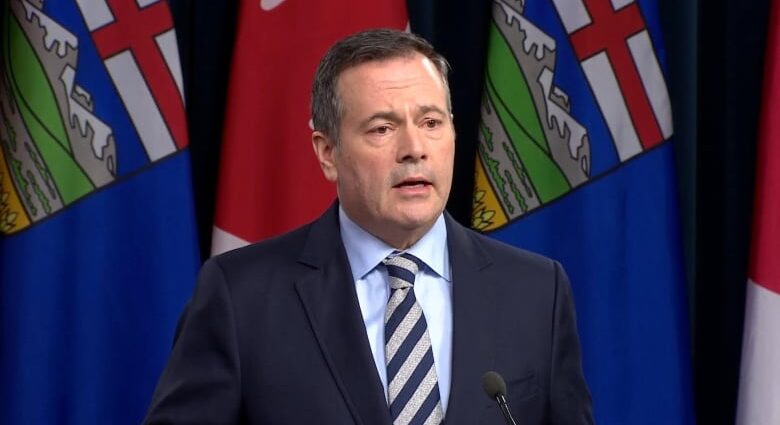With the number of active COVID-19 cases continuing to decline, Alberta may be able to speed up plans to move into Stage 2 of its relaunch strategy, Premier Jason Kenney says.
Final decisions have not been made, but Albertans can expect an announcement early next week, Kenney said Wednesday at a news conference.
“Here’s the great news,” the premier said when asked about the relaunch. “The numbers have continued to move very much in the right direction. We’re down to just over 50 people with COVID in Alberta hospitals. Only five or six in intensive care, and I think only one or two using ventilators.”
Given that the province has successfully flattened the curve, Kenney said, the number of acute care beds designated for COVID-19 patients has been reduced from 2,800 to 1,000, with only about four per cent of those currently being used.
Stage 2 of the relaunch plan has been scheduled to begin on June 19.
“We’ve been in discussions with the chief medical officer [of health] and through her, her team, and I think there is a high level of confidence that we can move forward with the Phase 2 of relaunch, and possibly move forward some of the activities that had initially had been planned for Phase 3 into Phase 2.”
Under Stage 2, more businesses and services would be allowed to reopen, with restrictions. Businesses listed by the province under Stage 2 include movie theatres and live theatres, libraries, acupuncture and massage therapy, artificial tanning salons, esthetics, cosmetic skin and body treatments, manicures, pedicures, waxing, facial treatments and reflexology. Larger gatherings might be permitted in some situations.
Under Stage 3, the list of businesses and venues that would be allowed to reopen, with restrictions, includes arts and culture festivals, concerts and major sporting events, nightclubs, gyms, pools, recreation centres and arenas.
It has been almost three months since the province reported its first case on March 5.
Latest numbers
On Wednesday, Alberta reported two more deaths from COVID-19 and 19 new cases of the illness. Laboratories conducted 4,997 tests over the past 24 hours.
The two most recent deaths were both from Calgary — a woman in her 90s from Extendicare Hillcrest, and a woman in her 80s from Intercare Chinook Care Centre. The deaths bring the total to 145.
There were 344 active cases in the province, the lowest number since March 24.
The regional breakdown of cases was:
- Calgary zone: 255 active, 4,548 recovered
- Edmonton zone: 45 active, 505 recovered
- North zone: 22 active, 214 recovered
- South zone: 21 active, 1211 recovered
- Central zone: zero active, 97 recovered
- Unknown: one active, 12 recovered
At total of 6,587 people have recovered from COVID-19.
Forty-eight people were in hospitals being treated for the illness, six of them in intensive care beds.
Antibody tests coming
Dr. Deena Hinshaw, Alberta’s chief medical officer of health, said researchers continue to study the virus and are constantly learning more about how it affects people as they look to develop new ways of testing.
“One subject I receive many questions about is serological or antibody testing,” Hinshaw said Wednesday at a news conference. “This form of testing is used to detect the presence of antibodies in a person’s blood. A positive test means that someone contracted COVID-19 at a point in the past, even if they have now recovered.
“Not all antibodies protect from re-infection, and antibody levels can drop over time. Because of this, there is still not enough evidence to conclusively determine if a person who previously tested positive for COVID-19 would subsequently be immune.”
That is a key research question for scientists around the world, she said, and until the evidence is available it won’t be possible to determine who is immune, or for how long.
Alberta’s provincial laboratory is in the final stages of validating several different types of serology tests, Hinshaw said. When it’s available, that testing will be used for research purposes to determine the proportion of Albertans who have been exposed to COVID-19.
“Please be very cautious of products marketed as home serology tests,” Hinshaw said. “These tests may not be accurate and could produce false results, either false positives or false negatives.
She reminded the public that serology tests are not used to diagnose an active infection, but rather a past infection.
“As we still have active cases in our communities, our focus remains on diagnosing these active infections and preventing the spread.”
Hinshaw said there are multiple types of serology tests available, and the lab in Alberta was working with counterparts across the country, including the national microbiology lab, to test and validate each one.
“One of the things that’s really important is that when we do start using a serology test, is that we can be confident about how it performs, and different tests perform differently. So taking that extra validation step was important, so that we can be confident of the performance of a test when we start using it.”
Once the tests are validated, the province would need to order the kits, which are in high demand across the world, she said.
“And so that’s something that’s underway right now, is working on the test kit availability.”

